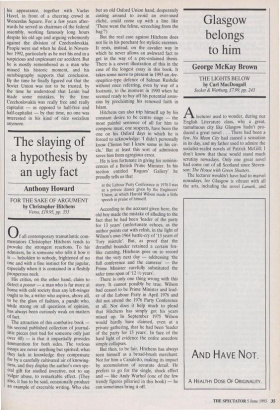There is a tide in the affairs of men and
he missed it
Anne Applebaum
HOPE DIES LAST by Alexander Dubcek liarperCollins, .£20, pp. 354 here is no such thing, they used to say in Eastern Europe, as a communist who is both intelligent and honest. Before the wall fell, the citizens of the Soviet bloc usually put their leaders into two categories: intel- ligent liars and honest fools. Reading his autobiography, one quickly concludes that Alexander Dubcek, first secretary of the Czechoslovak Communist Party during the Prague Spring of 1968 and the Soviet inva- sion of the following summer, belongs firm- ly in the second camp. Honesty and foolishness apparently ran in his family. When' young Alexander was only three years old, his parents — well-meaning, working-class Slovak social- ists — were lured to Soviet Kirghizia by a charlatan who promised fertile farmland and social justice. When they got there — surprise! — they discovered that the land was bad, conditions were primitive, and that forced collectivisation was driving the local Kirghiz farmers into armed resis- tance. The family eventually fled Stalin's purges, and Dubcek records the fear he felt crossing the border back to Slovakia. Yet he failed to draw any immediate conclu- sions from the experience: 'Somehow I repressed the memory of these moments for years.'
This experience was a forerunner of many more to come. Throughout his life, Dubcek confronted Soviet duplicity again and again. Every time, he closed his eyes and insisted on believing that, deep down inside, the Russians meant well. For many years, Dubcek could not admit that the Soviet Union had deliberately failed to come to the aid of Slovak rebels who tried to oust their fascist rulers in 1944: 'I refused to believe that the Soviets were capable of such behaviour.' As a student at the Moscow Higher Political School in 1955, he listened to the gossip of the Rus- sian students and 'was shocked when they stated bluntly that Stalin had been a mur- derer'. Most extraordinary of all, however, was his failure to imagine, let alone to fore- see, the Soviet invasion of his country in 1968: 'At no point between January and 20 August, in fact, did I believe that it would happen.'
Didn't he? Czechoslovakia was not, after all, an independent state at that time, and Dubcek himself was hardly more than a puppet dictator. But Dubcek, at least as he comes across in this autobiography, seems to have understood neither his country's political situation, nor his own. In 1968, after 20 years of Soviet occupation, he still believed in the essential goodwill of his Soviet comrades, and could not compre- hend why they might not want the Czechoslovak reform experiment to suc- ceed. So he became a puppet dictator who tried to pull his own strings and was crushed in the process. These are harsh words, perhaps, for a man who loved gardening, stayed faithful to his wife, and tried, during his few months in power, to make communist Czechoslovakia into a nicer place. 'Neither my allies nor I ever contemplated a dis- mantling of socialism,' he writes; but they did want to rehabilitate victims of Stalin- ism, to let small shopkeepers and car mechanics flourish, and to introduce more democracy, at least within the Communist Party. At the time, these policies did seem radical — particularly the introduction of capitalist incentives into a socialist econo- my — and Dubcek was hailed, in 1968 and afterwards, as a reforming hero. But in the years since, similar half-way measures have been applied disastrously in Jaruzelski's Poland, and ineffectively in Gorbachev's Russia; in China, a little bit of capitalism and a touch of democracy applied to an essentially unreformed communist system led to Tiananmen Square. In retrospect, Dubcek's Czechoslovakia looks not radical but naïve. That may explain why there is so little nostalgia for Dubcek's Czechoslo- vakia in Prague, which would be celebrat- ing the 25th anniversary of the Prague Spring this year if anyone could be both- ered — if, that is, the city were not s° wrapped up in stock markets and mass pa' vatisation programmes and foreign invest- ment schemes.
It is true that there is nostalgia for Dubcek himself. One of the great moments of the Czechoslovak revolution of 1989 Was his appearance, together with Vaclav Havel, in front of a cheering crowd in Wenceslas Square. For a few years after- wards he served as chairman of the federal assembly, working famously long hours despite his old age and arguing vehemently against the division of Czechoslovakia. People were sad when he died, in Novem- ber 1992, particularly as he met his end in a suspicious and unpleasant car accident. But he is mostly remembered as a man who missed his historic moment, and his autobiography supports that conclusion. By the time he finally figured out that the Soviet Union was not to be trusted, by the time he understood that Lenin had made some mistakes, by the time Czechoslovakia was really free and really capitalist — as opposed to half-free and half-capitalist — by that time, no one was interested in his kind of nice socialism anymore.



























































 Previous page
Previous page